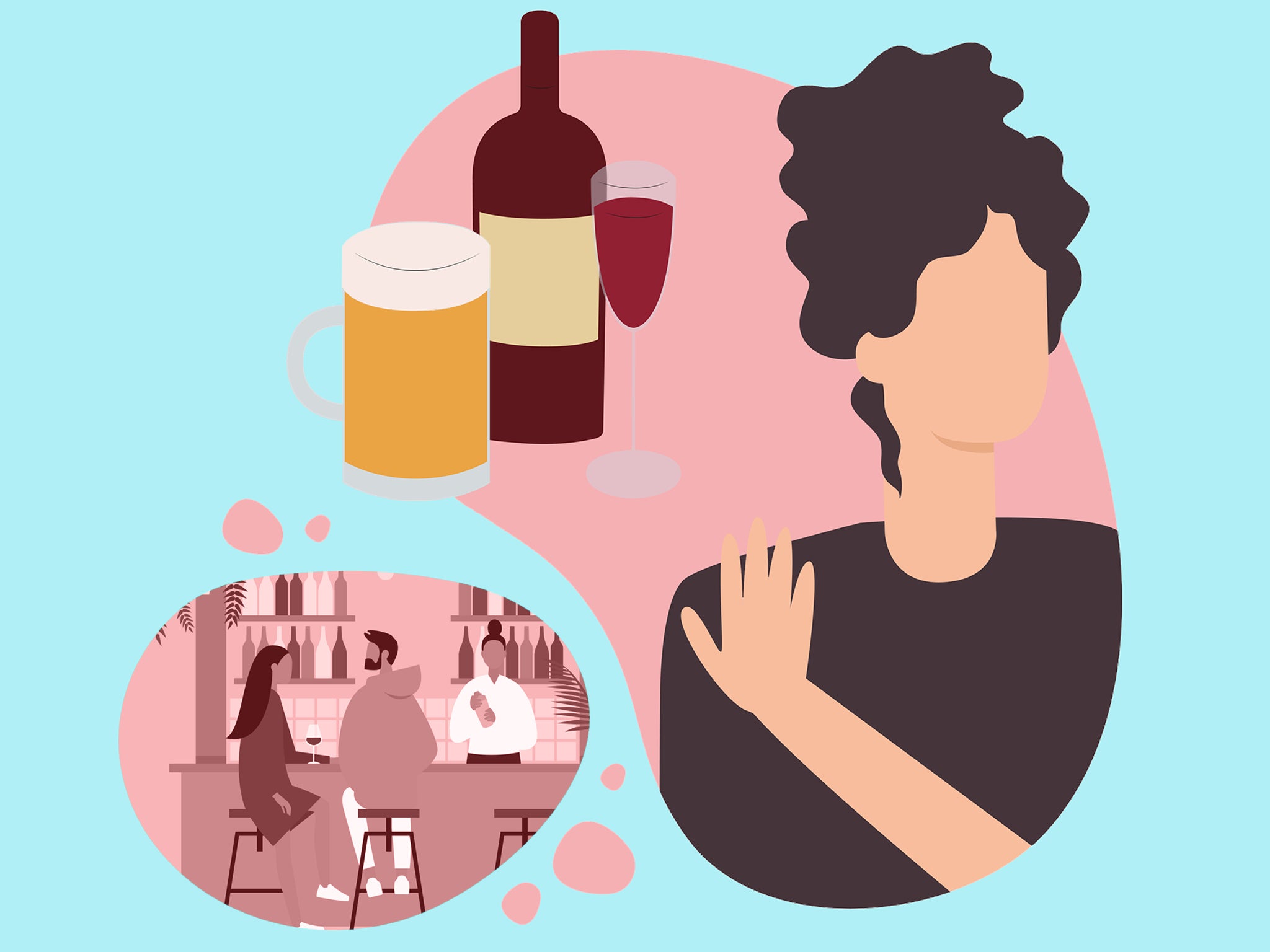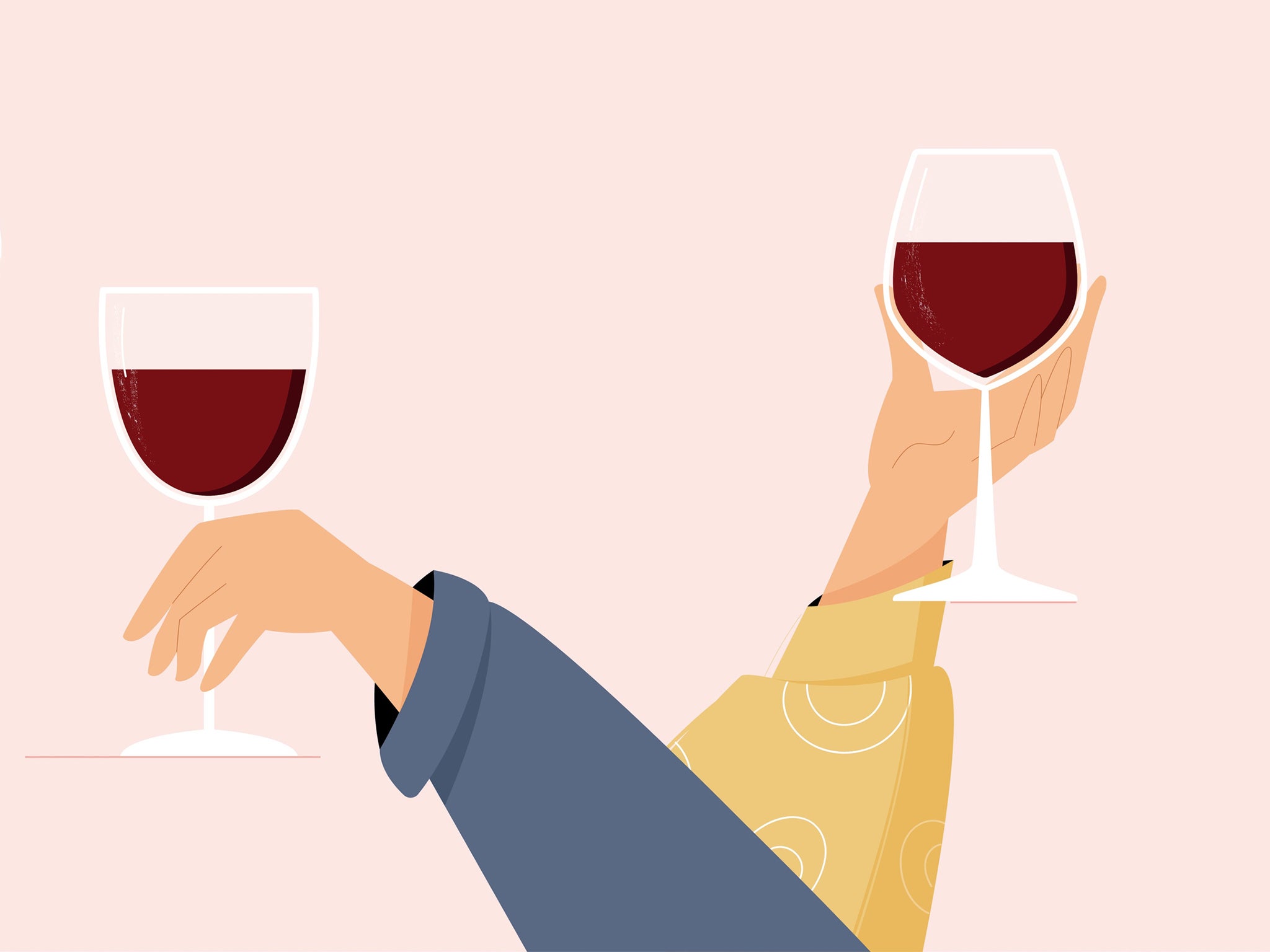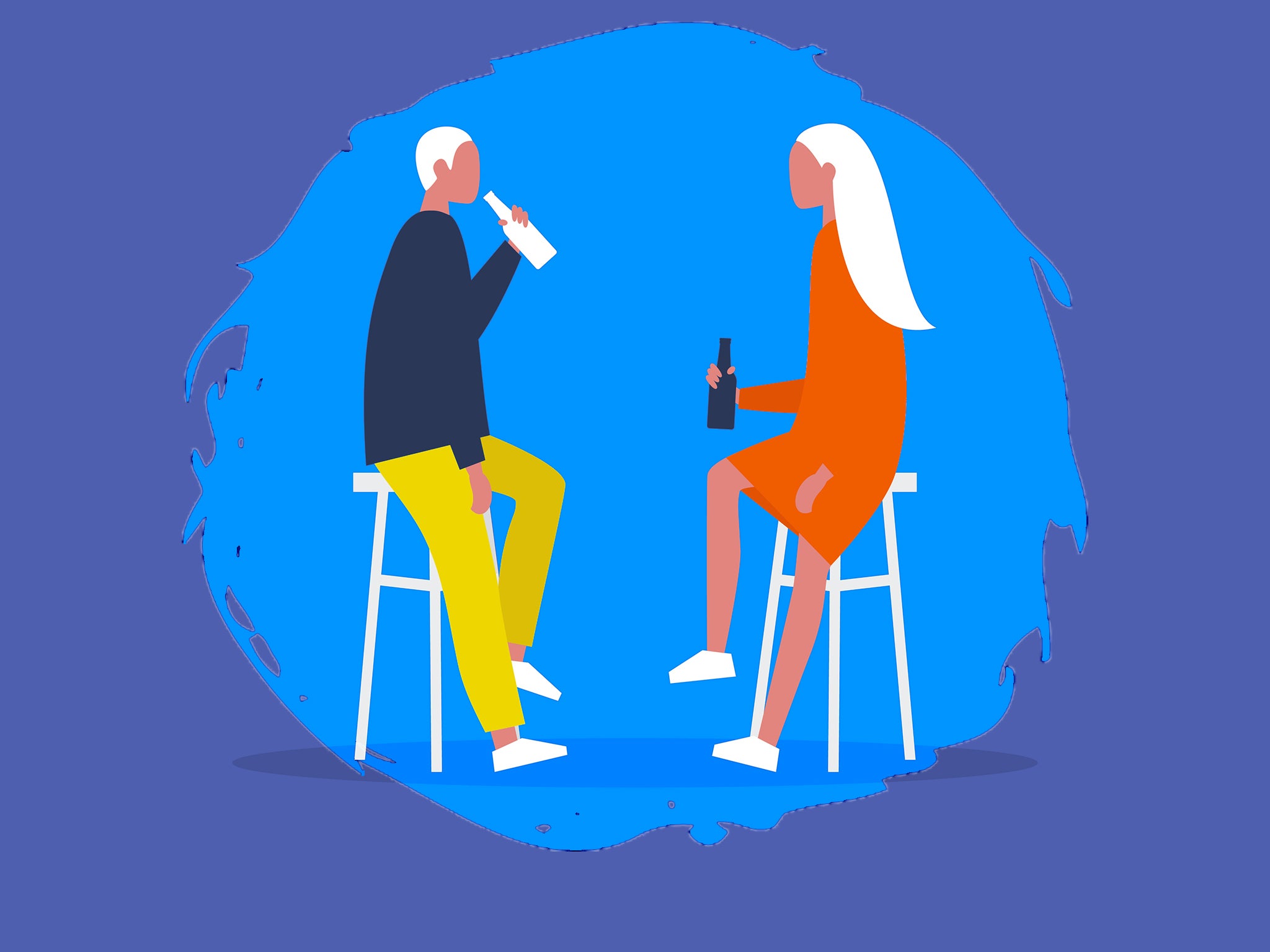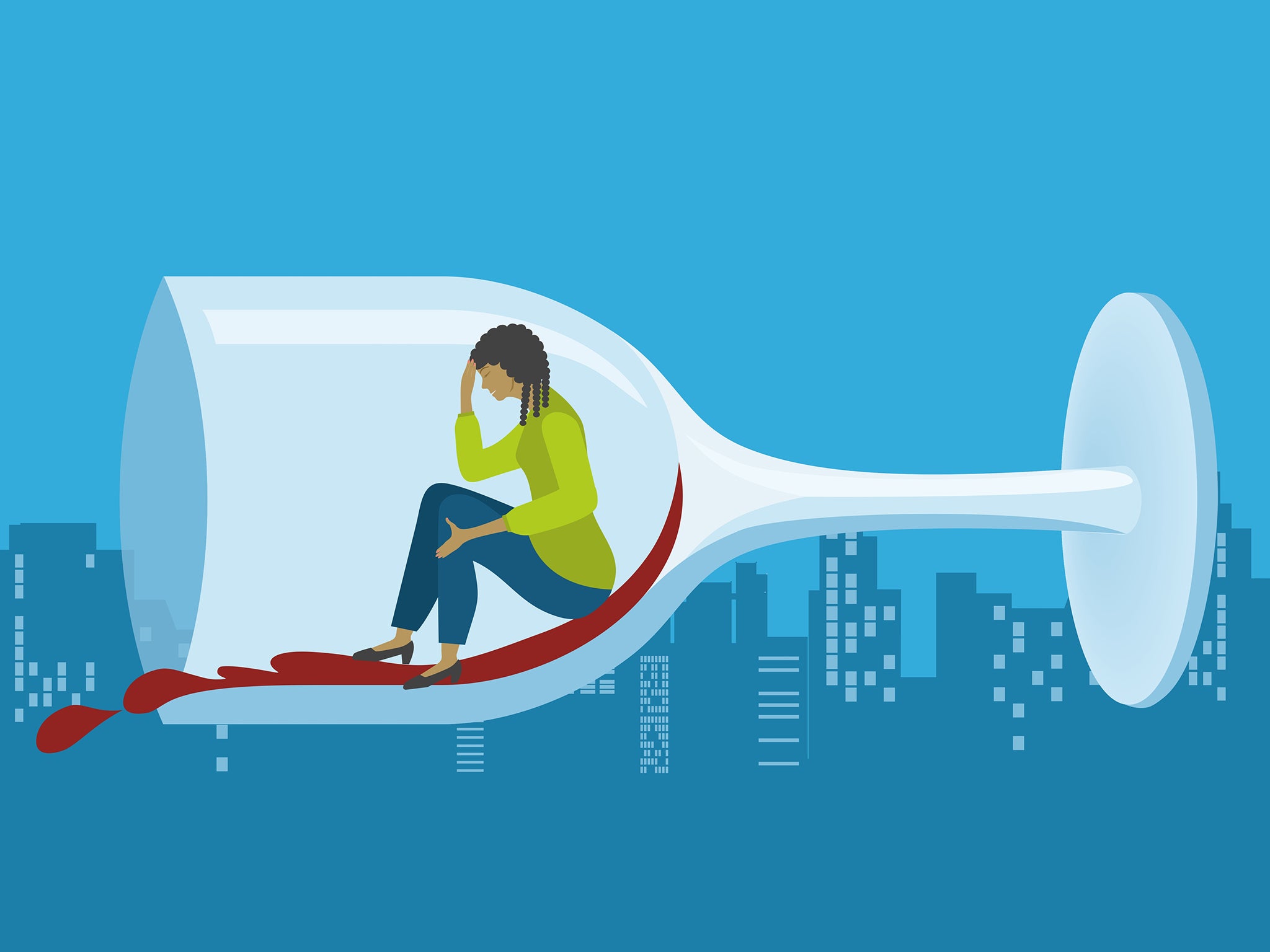What I learned about my mental health when I gave up alcohol
Like many Britons, alcohol has played a big part in my life. I’ve used it to socialise and also to self-medicate, but after lockdown I decided it was time to cut it out and start caring for myself, writes Harriet Williamson


In Britain, we have a specific drinking culture. If you’ve ever been on a British high street after nightfall, or to a pub, or to watch live sport, or to a university, or a holiday destination favoured by Brits, you’ll have seen it. It tends to be immoderate, even excessive, about group identity and one-upmanship. It seems to be volume consumed, rather than about complementing food, as is the case in, say, France.
We drink at virtually every occasion: from weddings, christenings, birthdays and wakes, to cans in front of the telly, G&Ts after work, weekend bottomless brunches, and wine and ice cream after a breakup. Whether you’re celebrating or commiserating, bored or anxious – there’s a drink for that.
Last year, I decided to stop drinking alcohol. I’d spent the past 15 years boozing – almost always at “binge drinking” levels – and I could no longer justify the negative impact it was having on my life. I’ve now been alcohol-free for over 250 days, and I feel like a different person. That’s not solely down to packing in the drink, but it’s been a big part of it.
In the UK, we spend about £20bn per year on alcohol. This household expenditure has almost doubled between 1987 and 2020. In the same period, alcohol became 74 per cent more affordable.
Our drinking culture affects the NHS. In 2019/20, drinking alcohol was the main reason for approximately 280,000 hospital admissions – 2 per cent higher than the previous year. The number of prescriptions issued to treat alcohol misuse in England was 167,000 in 2020/21 – an increase of 1 per cent on the year before. Government research from 2018 highlighted alcohol misuse as the biggest killer of working-age adults in England.
It seems like alcohol gets a free pass in Britain, unlike tobacco which is heavily taxed, and drugs which are heavily criminalised. The alcohol industry is significantly financially dependent on people who drink too much, and if all consumers reduced their booze intake to within guideline levels, alcohol sales revenue would decline by an estimated 38 per cent – around £13bn.
“Governments of all colours have been reluctant to address known problems with alcohol, including health-related issues and fair taxation,” Ian Hamilton, associate professor of addiction at the University of York and Independent columnist, tells me. “Despite significant evidence of the harm alcohol has on individuals and wider society, policymakers are wary of tackling the issue.”

This was demonstrated clearly in the Scottish government’s attempt to introduce minimum unit pricing, which took years of legal wrangling with the alcohol industry. It has now been demonstrated to reduce harm, as it helps protect those most at risk of drinking harmful levels. The alcohol industry knows that a small proportion of drinkers consume a significant volume of their product so were opposed to the minimum unit pricing policy.
Hamilton tells me that despite looking at minimum unit pricing, Westminster is yet to agree to introduce this policy, revealing how effective industry lobbying is. The narrative that has been pushed, he says, is that drinking alcohol is an “individual responsibility”, relieving the role of industry and state in helping those who develop problems.
As a teenager, I was presented with very little – if any – information about drinking responsibly, such as making sure I’d eaten beforehand, not mixing drinks, keeping myself safe while drinking, and being aware of things like drink spiking and date rape. Those conversations were important, and I don’t remember having them in a way that was accessible or free from judgement.
There was nothing about the taste that I enjoyed, but I did appreciate the numbing, warming, floating sensation that accompanied it
When the British drama Skins premiered on Channel 4 in January 2007, it swiftly established itself a cultural touchstone for young people. I was 16, roughly the same age as the cast, and the show’s writers addressed many issues that my peers and I could relate to. I wanted to be those characters, particularly the achingly beautiful and mysterious Effy, played by Kaya Scodelario. I understood the rage and angst, and their messy love lives, raves, house-trashing parties, clothes – it looked pretty cool.
The first time I got really drunk, a few friends and I asked the older boyfriend of a girl in our year to buy us each a medium-sized (35cl) bottle of vodka. It might have been Glen’s. We swigged from the bottles – no mixer – and rolled up at a party uninvited. I remember thinking it was absolutely foul stuff, it burned my throat and stomach, it made my taste buds shrivel and my belly contract and curl. There was nothing about the taste that I enjoyed, but I did appreciate the numbing, warming, floating sensation that accompanied it.
I also thought that it was something that every self-respecting teenager was supposed to be doing. I didn’t understand the effect of alcohol on the normal development of vital organs – including the brain, bones, liver and hormones. I didn’t know that the feelings of despair and anxiety I was experiencing would be exacerbated by heavy drinking. It was a way to seem cooler than I was, to fit in, to keep up and to be “part of things”.
At university, my social life revolved around binge drinking, and I wasn’t alone. I didn’t know anyone who didn’t pre-drink before going out. I worked on the bar and cloakroom in a nightclub where we’d line up row upon row upon row of plastic cups on our most popular nights, filled with cheap vodka and even cheaper energy drinks. Each “vodbull” was priced at £1.50. Jägerbombs were the tipple du jour, cool kids drank whisky, did shots and swiftly polished off their pints of snakebite or “purple” (lager and cider, with a dash of blackcurrant cordial) in “boat races” – among other drinking games.

Later, throughout my 20s, I used alcohol to self-soothe, to self-medicate, when no NHS intervention seemed to be able to “fix” my intrusive thoughts, panic attacks, generalised anxiety, low mood, sensory processing issues and extreme levels of self-hatred.
Heavy drinking was socially acceptable. Big, messy nights with friends? Using alcohol to unwind after a long day? Mind-bending, full body-ruining hangovers? Can’t remember most of your night? Don’t worry, everyone’s at it. I kept quiet about drinking on my own during the day, and how I couldn’t face social situations without alcohol. But it wasn’t drugs, right? And it wasn’t the obvious horror of self-harm.
I became the person who was always suggesting that a social activity included booze, petrified that without it, I’d be too anxious and self-conscious to cope. I didn’t think it was a problem, because I didn’t crave a drink upon waking up. However, when I was prescribed a course of antibiotics with the instruction “don’t drink any alcohol”, I felt a terrible sinking sensation. This was a warning. I wish I’d listened, and stopped then, but I wasn’t ready to hear it.
The decision to cut out alcohol arrived in an understated manner. I’d moved flats, I was working a job that I really loved and was loath to jeopardise. I was feeling uncomfortable with the “lockdown weight” I’d gained. But more than that, I actually wanted to care for my body for the first time in my life.
Going sober has stabilised my mood, reduced the levels of anxiety I experience, allowed me to think more deeply about the kind of person I am, and given me a sense of control over my life
My physical form has always been the canvas upon which I’ve written pain – in starving myself, eating too much, making myself sick, cutting and burning my skin, purposely neglecting basic needs – and abusing alcohol. Self-hatred, crystallised hard through repeated traumatic events, resulted in my rubbishing of my body at every possible opportunity. It was a revelation to consider that I could start being kind to it, and finally honour it for putting up with so much over the years, for carrying me around and continuing to function despite what I’d inflicted upon it.
If I think about all the days in bed, violently hungover and straining to remember what had happened the night before, the money I’d spent, the way I’d lie awake at night torturing myself over the stupid, drunk things I’d said and done, the areas of my life I’d neglected in favour of getting plastered – I feel angry at the sheer waste of it all.
“It is no surprise that people with mental health problems, diagnosed or not, are more likely to use alcohol than those that don’t have mental health problems,” says Hamilton. “Alcohol is effective in the short term at dampening troubling thoughts and feelings, and it is more affordable and available than ever. All of this is facilitated by wider acceptance of alcohol compared to other drugs like heroin, even though both can be used to self-medicate.”
The depressant effects of alcohol are now well-documented, and there is more discourse and openness around the impact of alcohol on anxiety, including in the “hangxiety” period the day after. I largely pooh-poohed the idea that cutting down on or giving up drinking would be helpful, it felt like – to paraphrase Basil Fawlty – an avenue of pleasure being closed off. But when I really stopped to think about it, I realised that the pleasure aspect was in dangerously short supply.

It was more like gulping down some medicine and being rewarded with a temporary numbness and lack of inhibition, and then hurrying to top up with more and more booze to keep that feeling going – than experiencing true enjoyment. Once this had dawned on me, I felt free.
I hesitate to write this, but the correct word to describe going alcohol-free is, for me, “revolutionary”. I feel revolutionised. Like myself, but an upgraded, more curious and clear-thinking version. It’s allowed me to be more present with those around me, cultivate meaningful relationships and be productive, playful and imaginative in a way I thought was impossible. My mental health is the best it’s ever been, after struggling with mental illness and the symptoms of different diagnoses for the vast majority of my life.
Going sober has stabilised my mood, reduced the levels of anxiety I experience, allowed me to think more deeply about the kind of person I am, and given me a sense of control over my life that I was previously lacking. I’m able to notice uncomfortable feelings and distressing memories when they arise, and just be with them, rather than immediately attempting to numb myself with alcohol.
My fears that I’d face miserable, exiled-to-Siberia levels of social exclusion when I stopped drinking were unfounded. In fact, I’ve made new friends (both drinkers and non) and enjoyed a lot of support from those I love. I’ve also been inspired by people in peripheral friendship circles, quietly getting on with being alcohol-free but still throwing themselves into every activity, from attending football matches to going on stag weekends.
Around 20 per cent of people in Britain don’t drink at all, and there is a growing trend of non-drinking among those between the ages of 16 and 24. For me, alcohol was the socially acceptable, over-the-counter, readily available drug I used to mask the long and medium-term impact of trauma. It took me more than a decade to realise that the harm it was causing to my health and relationships was not worth the temporary respite it provided.
My purpose here is not to recruit anyone into a life of teetotalism, but to examine what it has meant for me in the context of alcohol’s cultural significance in the UK. I’ve previously written about how an alcohol-free life has proved to be a gift, both to me and those around me, rather than a loss or absence. I still feel sad sometimes, and anxious and empty and lonely, and I remember things that are painful, but that’s human. There is a new knowledge that I don’t have to be overwhelmed or consumed, and these feelings will pass, like clouds over the sun.




Join our commenting forum
Join thought-provoking conversations, follow other Independent readers and see their replies
0Comments